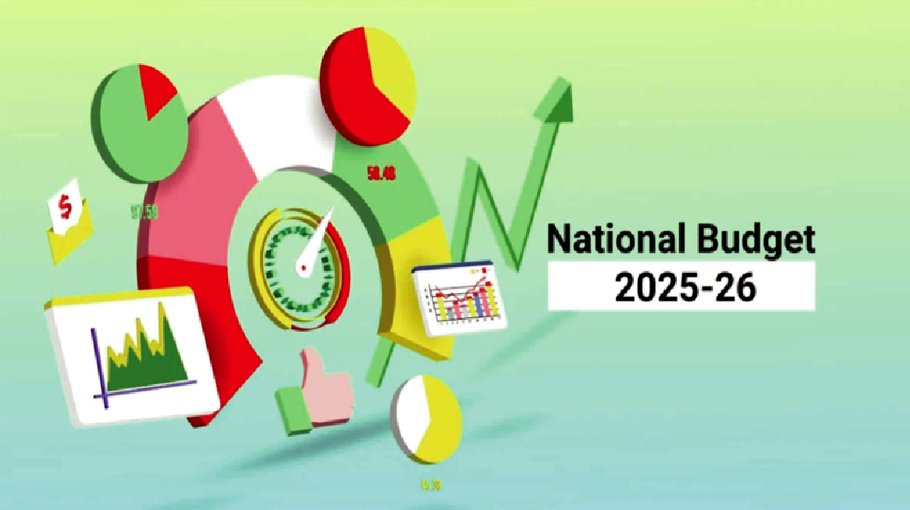Budget on equitable footing proposed
Key focus on inflation, boosting pvt investment, social safety net

The interim government has unveiled a proposed Tk 7,89,999 crore national budget for the fiscal year 2025-26 with a key focus on controlling high inflation, boosting private investment and expanding social safety net.
The government has proposed the national budget on a rational footing without any exaggerated promises and ‘building an equitable and sustainable economic system’.
Finance Adviser Dr Salehuddin Ahmed in a televised speech on Monday placed the budget, which is 0.9 percent (Tk 7,000 crore) lower than the current fiscal year's outlay of Tk 7,97,000 crore.
This is the first budget, presented by Dr Yunus-led interim government, which puts special emphasis on education, health, good governance, civic facilities and employment generation.
“It is expected that the growth rate will rise to 6.5 percent in medium term.”
Terming the proposed budget unusual, the finance adviser said, “This year's budget is somewhat exceptional. For the first time in the country's history, we are proposing a smaller budget for the next fiscal year than the budget for FY2024-25.”
“Moving away from a growth-centric concept, we have tried to emphasise the concept of holistic development,” said Salehuddin, also the former governor of Bangladesh Bank.
“Therefore, instead of highlighting the traditional physical infrastructure development, we have given priority to the people in this year's budget,” he added.
The adviser further said that without ensuring the essential elements of guarantee of fundamental rights, necessary measures for good living, security of livelihood and environment free from discrimination any state becomes ineffective, and the foundation of a society weakened.
Budget Deficit
The proposed budget for FY26 has projected a deficit of Tk 226,000 crore, down from Tk 2,56,000 crore in the current fiscal year, representing 3.6 percent of GDP.
“Although the expenditure on principal and interest payment of foreign loans increased due to the huge depreciation of Taka against US dollar during the tenure of the previous government, our overall budget deficit will remain at a tolerable level,” the finance adviser said.
“Of the total deficit in the proposed budget, I propose to spend Tk 125,000 crore from domestic sources and Tk 101,000 crore from foreign sources,” he added.
The finance adviser also said that in the next fiscal year, total expenditure on interest payment has been estimated at Tk 1,22,000 crore, including Tk 1 lakh crore for domestic interest payment and Tk 22,000 crore for foreign interest payment.
The budget deficit for the current fiscal year was originally estimated to be Tk 256,000 crore. In the revised budget, the deficit has been proposed to be Tk 226,000 crore, which will be 4.1 percent of GDP.
“Of the total deficit in the revised budget, I propose to collect Tk 117,000 crore from domestic sources and Tk 109,000 crore from foreign sources,” he added.
Revenue collection target
The proposed national budget the revenue collection target at Tk 5.64 lakh crore, which is equivalent to 9 per cent of the country’s Gross Domestic Product (GDP).
Salehuddin said efforts are underway to rationalise tax exemptions and achieve medium-term revenue goals through the continued initiatives of the National Board of Revenue (NBR) that to enhance revenue collection.
He also mentioned that NBR has been strengthened with increased manpower to support these efforts.
“Steps are actively under consideration to gradually reduce tax exemption facilities expand the tax net and introduce uniform VAT rates on various goods and services where possible,” he added.
Of the total estimated revenue income of Tk 5.64 lakh crore, Tk 4.99 lakh crore is expected to be collected through NBR, while the remaining Tk 65,000 crore is projected to come from other sources.
The adviser noted that the budget size has been kept relatively smaller this year in a bid to keep the deficit under control and in line with prevailing realities. “Amid ongoing political unrest, the new budget aims to bring some ‘relief’ to low-income groups.”Inflation
The finance adviser said that the point-to-point inflation will fall below 8 percent by June.
“The fight against inflation, however, may result in a slightly lower GDP growth rate compared to previous years,” he added.
According to provisional estimates, GDP growth in FY2024-25 could be 3.97 percent.
“However, we expect the final estimate to be higher. We also expect that the growth rate will rise to 6.5 percent in medium term,” the adviser said.
To maintain the downward trend in inflation, he stressed the need for a stable exchange rate of taka against foreign currencies. He also stressed that achieving such stability requires maintaining adequate foreign currency reserves.
About inflation control measures, the adviser noted that the government has consistently implemented a contractionary monetary policy in recent months.
According to the finance adviser, point-to-point inflation has dropped from 10.89 percent in December 2024 to 9.17 percent in April 2025.



